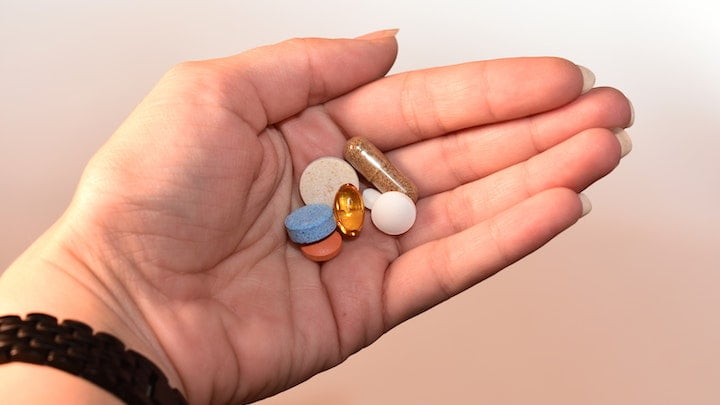Ecstasy can stay in your system for hours or even days after you have used it.
Depending on the testing method used and the amount is taken, this drug can be detected for several months after your last use.
There are several ways to test for ecstasy, and this article will cover all of them.
Continue reading to learn more about ecstasy, the effects of this drug and how long it stays in your system.
Facts about ecstasy (MDMA)

What is ecstasy?
Ecstasy is an illegal stimulant drug that is sold recreationally and is also commonly known as MDMA, Molly, E and XTC.
You will likely encounter it in the form of a pill which may be swallowed, and many illegal manufacturers will stamp them with a colourful logo to make them seem more appealing.
It is often used as a recreational drug at parties, clubs and raves, although many people are now using it in various other settings.
Ecstasy can make you feel extremely happy and energised. You may find it easier to strike up a conversation with other people and will be able to dance for hours. [1]
However, ecstasy can also cause you to grind your teeth, feel sick or even vomit, experience hallucinations, sweat profusely and be at greater risk of dehydration and brain swelling.
As ecstasy is illegal, many situations may call for a drug test to screen for this substance.
How does the body process ecstasy?
As ecstasy (MDMA) is commonly taken orally, this substance will be absorbed into the gastrointestinal system fairly quickly.
Your liver will then be in charge of processing the drug, and the process can take much longer if you continue to use MDMA throughout the day or night.
You can find more information about the half-life of ecstasy and how long it takes to process further in this article.
How long do the effects of ecstasy last?
Ecstasy is relatively fast-acting, with most people experiencing its effects within 30-45 minutes of taking it.
The effects of ecstasy (MDMA) will usually peak between 15-30 minutes after you first notice them.
Depending on how much ecstasy you have taken, you will generally feel the effects for anywhere between 4-6 hours to several weeks.
Many people take ecstasy multiple times in a 24-hour period as they attempt to continue the effects.
This can increase your chances of an overdose, as you will be effectively topping up the levels of MDMA in your system to the point where you are unaware of how much you have taken.
What is the comedown from ecstasy like?
An MDMA comedown can be extremely uncomfortable and unpleasant and is the main reason people continue taking ecstasy when they feel the initial effects begin to wear off.
The main symptoms of an MDMA comedown are severe anxiety and depression, which are thought to be contributing to the increased suicide rates in young people.
Common symptoms of an ecstasy comedown include the following:
- Heightened anxiety
- Depression
- Lack of appetite
- Low libido
- Difficulty concentrating
- Insomnia
- Feelings of tiredness and fatigue
- Mood swings
These feelings will fade with time, but you will need to completely stop using ecstasy to avoid them altogether.
What are the short-term and long-term effects of using ecstasy?

Many people see ecstasy (MDMA) as a fun party drug with little to no consequences.
However, using ecstasy even in the short term can result in many unpleasant side effects.
If you are a long-term user of this drug, you are putting yourself at risk of experiencing many chronic effects that can severely impact your quality of life.
In some cases, ecstasy use can result in death – even if this is your first time using it.
Some of the short-term effects of ecstasy use include:
- Grinding teeth
- Jaw pain
- Impaired decision-making
- Feeling paranoid
- Confusion
- Feeling nauseous
- Insomnia
- Extreme thirst
- Feeling faint
Some of the long-term effects of ecstasy use include:
- Increased risk of brain damage
- Higher risk of overdose
- Trouble with memory and making decisions
- Kidney problems
- More likely to develop an addiction
- Increased risk of developing psychosis
- Chronic anxiety
- Severe depression
- Cardiovascular problems
If you having used MDMA and are experiencing severe side effects, call 999 immediately and be very honest with them about what you have taken.
Understanding ecstasy (MDMA) addiction

Is ecstasy addictive?
It is possible to become addicted to ecstasy, particularly if you use it regularly over a long period of time.
Taking ecstasy causes the brain to release large amounts of serotonin, which is what causes that feeling of euphoria. [1]
You can become addicted to this sensation and continue to use ecstasy in an attempt to recapture the feeling.
In addition to the addictive properties of ecstasy itself, this substance is often cut with other drugs to bulk it out.
These include cocaine, heroin, LSD and amphetamines – all highly addictive drugs. Over time, you may become dependent on these substances without even realising that you have been using them.
What are the signs and symptoms of an ecstasy addiction?
If you believe that you may have developed an addiction to ecstasy/MDMA, check the following list of symptoms and see if there are any that you recognise within yourself.
Symptoms of an ecstasy addiction may include the following:
- Often feeling extremely thirsty and attempting to consume large amounts of water
- Clenching and grinding your teeth, can lead to dental problems over time
- Frequent heart palpitations
- Insomnia
- Muscle cramps
- Nausea and vomiting
- Using ecstasy/MDMA to avoid negative feelings
- Anxiety and depression
- Trouble concentrating in school or at work
- Avoiding responsibilities
- Prioritising ecstasy/MDMA over other things
Your doctor may be able to diagnose you with an addiction by running several physical and psychological tests.
You can also call us on 0800 326 5559 for a free and confidential assessment over the phone.
Is ecstasy (MDMA) legal in the UK?
It is illegal to use ecstasy/MDMA in the UK for any reason.
Ecstasy is classified as a Class A drug, which means the penalties for possessing, using, supplying or manufacturing this substance are particularly severe. [2]
If you are caught in possession of ecstasy you can be sentenced to up to seven years in prison and/or an unlimited fine.
If you are caught supplying or manufacturing ecstasy you can be sentenced to life in prison and/or an unlimited fine.
The larger amount of ecstasy you are caught with, the more severe your punishment will be. This is particularly true if you are a repeat offender.
It may seem like fun to use ecstasy/MDMA on a night out with your friends, but the repercussions can be very serious and may follow you for the remainder of your life.
A drug charge can make it difficult to get certain jobs, and you may not be able to visit some countries if you have a record.
How long does ecstasy (MDMA) stay in your system?

How is ecstasy tested?
In some situations, you will need to undergo a drug test to ensure there are no illicit substances in your system.
This may be required to secure an offer of employment or to ensure that you are able to safely use a vehicle or a piece of machinery.
Ecstasy is one of the substances that are likely to be tested for.
There are several ways to test for ecstasy in your system – some are non-invasive such as saliva tests while others including blood tests are slightly more invasive.
The most common ways to test for ecstasy (MDMA) include:
- Urine tests
- Blood tests
- Saliva tests
- Hair tests
Each method of testing can detect ecstasy in your system for different lengths of time.
What is the half-life of ecstasy?
The half-life of ecstasy is around eight hours, which is the amount of time it takes for your body to reduce the amount of this drug in your system by 50%.
In most cases it takes around five half-lives to remove 95% off ecstasy from your system, which works out to around 40 hours. [3]
This means that for at least 40 hours after you take ecstasy, you will most likely test positive in a drug screening.
Which factors affect how long ecstasy (MDMA) stays in the body?
Not everyone will metabolise ecstasy at the same rate, and some people may find that it remains in their system for longer than others.
There are several factors that can affect how long ecstasy stays in your system, and they include the following:
- How much water you have consumed
- Your general physical health
- Your age, gender, height and weight
- How much ecstasy you have taken
- How frequently you take ecstasy
- Your genetics – some people have a gene that breaks down certain substances faster
There is no way to quickly flush ecstasy out of your system – you will need to wait until your body has metabolised it.
How long does ecstasy stay in your urine?
Traces of ecstasy (MDMA) can be found in your urine for up to five days after your last use, or 120 hours.
Even if you drink large amounts of water, this substance can still return a positive result days after you last used it.
How long does ecstasy stay in your blood?
Testing your blood is an effective way to determine which substances someone has recently taken.
Your blood will test positive for ecstasy (MDMA) for up to 71 hours, which is the equivalent of three days.
How long does ecstasy stay in your saliva?
A saliva test is the least invasive way to test for ecstasy in your system.
Much like blood, your saliva can retain traces of ecstasy for up to three days after your last use, or 71 hours.
How long does ecstasy stay in your hair?
Your hair is where traces of ecstasy will be stored for the longest amount of time, with tests coming back positive for a minimum of three months after your last use.
This depends on how long your hair is and the section of hair from which the sample was taken.
Frequently asked questions

Is it possible to get a false positive on an ecstasy (MDMA) test?
In some cases, a test for ecstasy/MDMA can result in a false positive.
This is more likely if you have recently taken mebeverine, a medication prescribed for those who suffer from irritable bowel syndrome.
When screening for drugs such as ecstasy, it’s important to remember that certain medications and other substances can cause a false-positive result.
Make sure you let the person performing the test know about any other medications that you have taken beforehand to avoid confusion and a potentially incorrect test result.
How is ecstasy addiction treated?
The most effective way to treat an ecstasy addiction is to check into rehab, either as an inpatient or an outpatient.
Inpatient rehab involves living full-time at the clinic alongside other patients, while outpatient rehab involves attending rehab part-time while still living at home.
There are three distinct stages to rehab, both inpatient and outpatient.
Detox
An ecstasy detox involves completely stopping the use of this substance. It can be a difficult process and often results in uncomfortable withdrawal symptoms.
As MDMA is thought to be psychologically addictive as opposed to physically addictive, these withdrawal symptoms will usually be psychological in nature,
They are similar to an MDMA comedown and can include:
- Intense cravings for ecstasy
- Depression
- Anxiety
- Paranoia
- Loss of appetite
- Insomnia
- Confusion
- Agitation
These withdrawal symptoms can last for anywhere between one week to several months depending on the severity of your addiction.
It’s important that you detox from ecstasy in a safe and controlled environment such as a rehab facility.
Here, medical staff can observe and monitor you 24/7 to ensure that you do not develop any dangerous withdrawal symptoms.
Counselling
Once you have detoxed from ecstasy, you will begin the addiction counselling process.
This is a chance for you to explore the reasons behind your addiction and learn healthy ways to cope that do not involve drugs or other substances.
There are many different types of addiction counselling including cognitive behavioural therapy (CBT), dialectical behavioural therapy (DBT), group therapy, family therapy and holistic therapies.
Relapse prevention
Before you leave rehab, you will need to be prepared for life outside of a medical environment.
You may have easy access to MDMA when you are back home, and relapse prevention gives you the tools and knowledge needed to navigate your new sober lifestyle.
This may involve roleplaying scenarios that may occur, planning how to make the necessary changes to your lifestyle and arranging ongoing counselling or support group meetings.
References
[1] https://nida.nih.gov/publications/research-reports/mdma-ecstasy-abuse/mdma-addictive





